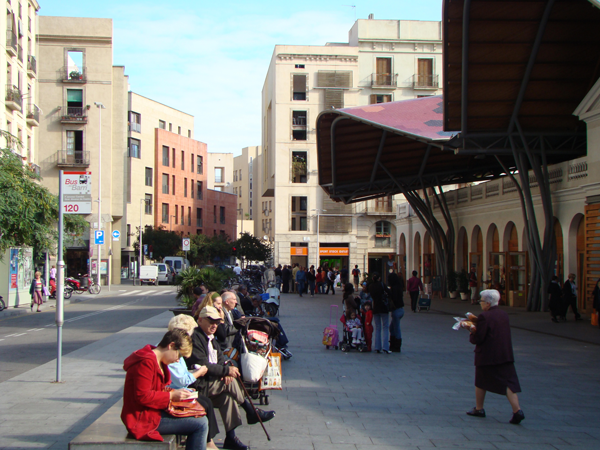Rebecca Smyth, Spain, SSH Blog Correspondent

Tucked away down one of the many labyrinthine streets of Barcelona’s El Born district, Col·lectiu Punt 6 is an organisation formed by and intent on forming the space which it occupies. They very kindly invited me along for a chat on Tuesday to tell me about their origins, development and objectives.
The first seeds were planted in 2004, when the Catalan government of the time passed the so-called ‘Llei de barris’ (Llei 2/2004 de millora de barris, àrees urbanes i viles que requereixen una atenció especial to give it its full title; it roughly translates to ‘law for the improvement of neighbourhoods, urban areas and towns which require special attention’). An ambitious project, the law aimed to improve civic participation and social inclusion through a multi-pronged approach to urban planning and development.
In order to receive funding, any proposed project must include action on eight ‘points’, the sixth of which is the promotion of gender equality in the use of public space and facilities – hence the collective’s name. It began life as a project sponsored by l’Institut Catala de la Dona (Catalan Institute of Women) in collaboration with l’Universitat Politecnic de Catalunya (Polytechnic University of Catalonia) and hasn’t shown any sign of slowing down since.
From 2006 to 2011, the group gained momentum, members and influence. It facilitated workshops with diverse groups and provided formal and informal training. 2011 saw the formalisation of the collective, which operates on a cooperative-type basis.
And goodness are they a formidable bunch: architects, sociologists and activists, often all in one, Punt 6 is a group on a mission. They have an extensive list of publications to their names (available here and here) as well as a strong presence in the vibrant world of Barcelona activism. They organised a Jane’s Walk in May of this year and have collaborated with other feminist organisations in Barcelona in the innumerable marches, festivals and street parties that punctuate daily life in the city.
As if that wasn’t enough for a group of people trying to write their doctoral theses, they also have projects in Málaga, Argentina and Colombia. The link between Punt 6 and Latin America is a strong one, given that one of their founding members, feminist architect and activist Zaida Muxí Martínez, is originally from Argentina.
I had the privilege to meet Blanca Gutiérrez Valdivia, Sara Ortiz Escalante and Roser Casanovas on Tuesday morning, and bombarded them with questions about their experiences thus far.
If there’s one thing that struck me as I sat and chatted away with them, it was just how much can be achieved by a small group of people with a clear idea of what they want to do. I felt and still feel immensely buoyed up by having witnessed first-hand their impressive work.
Having talked about where they’d come from, the conversation moved to where they hope to go and how they want to get there. Ultimately, their goal is to reshape urban space so that it takes into account women’s needs and experiences. This in turn requires an intersectional approach to six key themes: public spaces, facilities, mobility, housing, public participation and safety. This boils down to whether or not women and other minorities not only feel safe passing through public spaces, but also feel welcome to participate in them. They want to make women’s experience of urban space more visible, and also facilitate women’s awareness of urbanism and how to influence it. Along with this grassroots approach, they’ve worked in conjunction with local government initiatives. Like I said, a formidable bunch.
When asked about the wider political and social context here in Barcelona, Catalonia and Spain, all three women were unanimous in their agreement that it has shaped their work. There’s a longstanding tradition of political engagement and activism in this corner of the world, and the impact of the recession has also increased the already-existing desire for a social and political system that protects everyone’s interests and wellbeing. When asked about the interminable independence debate, theirs was a collective shrug. “Whatever happens,” Sara said, “We’ll continue our work.”
** For more information on Col·lectiu Punt 6, visit http://punt6.org/. Sincere thanks to Blanca, Sara and Roser for their time and willingness to share their experiences. **
Rebecca is currently living, working and stumbling through ballet classes in Barcelona. Originally from Kilkenny, she has a degree in European Studies and a Master’s in Gender and Women’s Studies from Trinity College Dublin, and will be doing an LLM in Human Rights Law in Edinburgh this fall.
